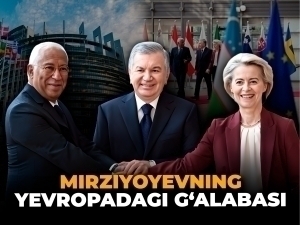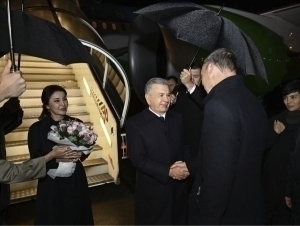Europe is Central Asia's 2nd trading partner – Antonio Costa
Local
−
05 April 2025 4454 7 minutes
Speaking yesterday, April 4, at the first Central Asia-European Union summit in Samarkand, European Council President Antonio Costa spoke about the new stage of relations between the two regions, Russia's aggression in Ukraine and Afghanistan:
"It is a great honor for me to chair today's historic event – the first summit between the European Union and Central Asia. First of all, I would like to express my deep gratitude to President Shavkat Mirziyoyev for the warm welcome you have given us in your beautiful country and for hosting us in the ancient city of Samarkand.
This city has left a deep mark on the history of our regions. Today, I am proud to witness a new page in the modern history of Samarkand – we are taking relations between the European Union and Central Asia to the level of an active and strategic partnership.
It has been 30 years since the European Union established diplomatic relations with the five Central Asian states. Now is the time to recognize how deep and significant the ties that bind us are. In recent days, I have had the pleasure of visiting the amazing cities of Bukhara and Samarkand. Here, I have not only discovered the rich history and culture of the region, but also felt the deep roots forged through centuries of cultural exchanges, scientific cooperation and trade that have strengthened our relations.
In today's international situation, the importance of a rules-based, effective and multilateral order cannot be overstated. Our meeting today will give impetus to the further development of cooperation between the European Union and Central Asia in many areas, which will strengthen our shared commitment to a peaceful and prosperous global order.
I also congratulate Uzbekistan on hosting the Samarkand Climate Forum today. This forum once again emphasizes the need for regional cooperation on pressing issues such as climate change and water resources management. These are some of the most serious challenges of our time, and we can only solve them together. We have already achieved a lot. The European Union is one of the main investors in Central Asia and the second largest trading partner in the region. Now, we need to take our cooperation to a new level in the future.
Climate change is an area where we need to work together, not just for our own interests, but for global stability, security and prosperity. Water scarcity, air pollution, environmental degradation and biodiversity loss are serious threats to the security and prosperity of both regions.
Europe’s two climate finance institutions, the European Bank for Reconstruction and Development (EBRD) and the European Investment Bank (EIB), are already supporting important climate action in Central Asia, and we are committed to significantly expanding our cooperation in this area.
In recent years, we have strengthened our engagement with your region through the European Union Strategy for Central Asia (2019), the Joint Roadmap for Deepening Cooperation between the European Union and Central Asia (2023), as well as the European Union’s Global Gateway Strategy. We are exploring new areas of cooperation in the fields of digital technologies, transport and raw materials.
However, I believe that our relationship has not yet reached its full potential. Our partnership is not a destination, but a shared path. Today's summit is the beginning of a new stage in our relations and is not a one-time event. I look forward to hearing your ideas and suggestions on how to strengthen our cooperation and focus on areas that will bring the most benefit.
Together, we must ensure that our strategic partnership is truly effective and proactive — and that it delivers long-term, tangible results.
As the common security challenges we face grow increasingly global, we must recognise that these threats are now transnational in nature. No region is immune to these threats, and we must further strengthen our cooperation at bilateral, regional and international levels.
The European Union is a long-standing security partner for Central Asia. Our programmes on border management and drug-related issues have demonstrated the EU’s commitment to the region for many years.
We have also supported various initiatives in the areas of counter-terrorism, law enforcement, countering the financing of terrorism, and preventing violent extremism and radicalisation.
Our ongoing dialogue on counter-narcotics between our regions provides an opportunity to further strengthen our cooperation on this issue. In particular, we have agreed to jointly launch a dedicated dialogue on countering terrorism and violent extremism. This is an important step in combating common security threats.
I would also like to take this opportunity to congratulate Tajikistan and Kyrgyzstan on the historic border agreement signed on March 13. This is an important achievement for both countries and the entire region. In these difficult times, we need to create more such positive solutions, as they will help resolve conflicts peacefully.
Turning to Afghanistan, several threats pose a risk here, in particular terrorism, extremism, and drug trafficking, which threaten to spill over into Central Asia and Europe. Central Asia has valuable experience and insights on how best to mitigate these threats. Together, we must work to ensure regional stability.
We are also witnessing a growing number of disinformation campaigns used for political manipulation. The European Union takes this threat very seriously and is committed to strengthening its capacity to counter information manipulation and other threats, not only on its own territory but also in partner countries.
The most pressing security challenge today is Russia’s ongoing aggression against Ukraine. This war has spread far beyond Ukraine and Europe. Russia’s war is not a local conflict; it is an attack on the fundamental principles of the rules-based international order.
For the third year in a row, Russia, as a permanent member of the United Nations Security Council, has been blatantly violating the UN Charter and international law, undermining the stability of the international system.
Now, a new momentum is emerging in the Ukraine peace process, which should lead to a comprehensive, just and sustainable peace. We must ensure this together. The European Union fully supports these efforts and contributes to them in every way.
The principles enshrined in the UN Charter are not just words on paper — they express a shared commitment to preventing conflicts between states, promoting peace and ensuring the well-being of citizens. These principles are as relevant today as they were when the UN was founded, and they form the basis of multilateral cooperation.
We must not only protect multilateral cooperation, but also reform it in a more effective, inclusive and improved way, in line with today's circumstances.
Our first summit is a concrete example of the stabilising role of regional cooperation based on trust on the global stage.
The European Union is committed to building a mutually beneficial partnership with Central Asia that goes beyond expectations and should be a living example of what can be achieved when countries come together in a spirit of cooperation.
Today's summit is an important turning point. We look to the future with hope and share the motto of this summit: "Investing in the future!"
Our relationship has never been stronger, and now we must begin to write the next pages of the strategic partnership between Central Asia and the European Union with lofty goals. Thank you."




